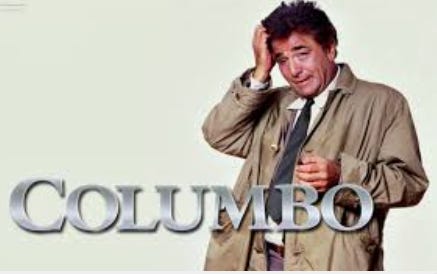Monk’s 125 episodes, which ran from 2002 to 2009 and garnered eight Emmys, are available to binge-watch two decades later. Called ‘the defective detective’ – a term dropped like a rock by the time of the 2023 movie Mr. Monk’s Last Case – the popular show followed in the lineage of Columbo, another quirky investigator with unusual mental powers who solves every case despite appearing ridiculous. The concept married Sherlock Holmes to Inspector Clouseau. But Monk isn’t incompetent like Clouseau; he has OCD, obsessive-compulsive disorder. The murder of his beloved wife Trudy caused him such grief that his symptoms worsened and he had to quit the San Francisco Police. Though unable to work, he takes on occasional murder investigations, noggin-cracking cases he always solves with his mental superpowers.
Monk trades on the savant syndrome, meaning a person who combines an extraordinary mental skill like mathematical calculation, musical ability or prodigious memory with a source of mental difference due to autism, brain injury or other mental issues. Sherlock Holmes fits this category. He’s socially challenged, blunt to a fault and depressive but his powers of observation and deduction are super-human. (Everybody refers to this as deduction although reasoning from facts to a theory should be termed induction.) Lisbeth Salander could be another example.
Columbo, Monk’s clearest predecessor, is a more ambiguous case. Some view his chronic forgetfulness as absent-minded professor syndrome while others say it’s a clever device, consciously wielded, for catching suspects off-guard.
Monk’s OCD behaviors are the show’s main source of laughs. Tony Shalhoub received three Emmys in the comedy category for his portrayal of Monk. Monk can’t bear a lack of symmetry, screams for a wipe after shaking hands and stays up till 3 am polishing light bulbs. But at the crime scene we stop laughing. He interprets details no one else noticed and envisions how the murder played out by walking around finger-framing the location. We don’t feel alienated by his super-intellect because we empathize with his painful situation. Laughing at his quirks creates a sense of shared humanity. The OCD is an endearing idiosyncrasy. In fact academics carried out surveys to explore how the show was improving people’s awareness of mental health issues.
By 2013 The Bridge, an American remake of the Nordic Noir hit Bron/Broen with a female detective on the autism spectrum, made sure an autism expert was on site for the filming of every episode. A Psychology Today article in May of that year excoriated the Monk episode “Mr. Monk Takes His Medicine” where Monk’s psychiatrist prescribes him a new drug and he has what his assistant Sharona calls ‘a reaction.’ He becomes impulsive, gregarious, carefree and ‘happy,’ blowing off a murder investigation to drive away in a red Mustang convertible. Mental health activists found this portrayal of psychiatric medication beyond the pale, not to mention treating his symptoms as comic. These days anyone wishing to use the super-popular trope of the neurodivergent detective must proceed with caution and sensitivity readers.
Tiptoeing around that flashpoint, let’s talk about another crime fiction issue Monk brings up: the representation of police. Like Columbo, each episode is an inverted murder mystery. We watch the commission of a murder first, then follow the efforts of the police and Monk to figure out who did it and how. When Monk uses fantastical methods of reasoning to reach a conclusion no one else imagined, we never doubt. We know he’s right because we were eyewitnesses. This creates a faith that they always solve the crime, they always nab the right guy.
After delighting in Monk’s crazy brilliance during the entire show, police step in at the last minute to make the arrest and whisk the killer away for well-deserved punishment. Police may draw guns and throw the guy against a patrol car to cuff him, but we’re sure he deserves whatever he gets. San Francisco is once again safe for middle- and upper-class inhabitants. (No homeless on these SF streets.)
Monk is a fairytale about transforming mental health issues into feats of ratiocination to support perfect policing. While Columbo depicts a slovenly working class cop outwitting the arrogant elite, Monk pretends a middle class guy with problems can keep San Francisco safe.
We didn’t even mention the gender insinuations. Monk’s passion for housecleaning, stay-at-home proclivity, lack of a reliable income and debilitating attachment to his dead spouse mark him as 50s feminine. Yet since he solves the crime while his female assistants remain clueless, gawking at his genius, traditional gender hierarchies stick. In short, Monk is a show that’s aging worse than Columbo, but is still apt for that late night hour when you need a shot of audio-visual melatonin. What do you think?








As a neuro-divergent writer with an invisible disability, I always try to be mindful of this stuff. Sometimes the best you can do is just to do no harm, and I think, given, especially that things have changed a little bit since the show first came out, they do a good job. The show shows some of the challenges a person with specific challenges and portrays it with some compassion. Nobody ever gets portrayed exactly how they would like and I think the show does a decent job of exposing people who have never given neurodiversity any thought to the concepts. As far as the background tropes of men in police and go, you could only reinvent so much stuff before you lose mass appeal and I think this network television show did OK. Modern, more aware writers might hit it differently today, but I think you can watch the show without any real guilt.
What do you think about Astrid: Murders in Paris (or whatever it's called when they show it where you live)? Personally I think it's very good and sympathetically done but I don't know...